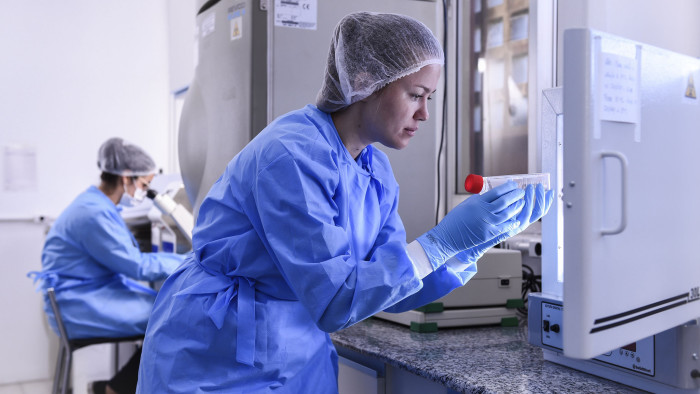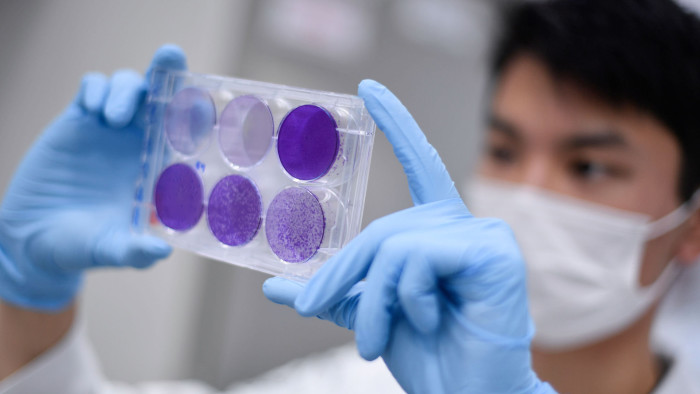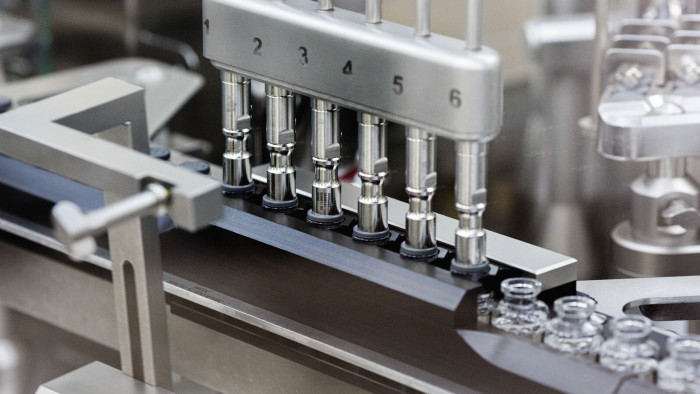Pandemic reopens wounds on IP rights

Roula Khalaf, Editor of the FT, selects her favourite stories in this weekly newsletter.
The race to develop vaccines and treatments for Covid-19 has been described by many world leaders as the greatest challenge of our lifetimes.
But the coronavirus pandemic has reignited a longstanding debate about intellectual property protection and wider public access to medicines, as well as whether some protections should be temporarily overridden to deal with a global pandemic.
IP and patent law allows pharmaceutical companies to protect their investment and reap the benefits of fortunes spent in developing new products. It can take a decade or more for a drug to be developed and come to market so being able to enforce legal rights is crucial.
Many lawyers argue that the robust IP regime has always fostered innovation and that is why countries can collaborate. Pharmaceutical companies say they intend to co-operate with rivals in an unprecedented way to help find solutions. Companies like GlaxoSmithKline have already said they do not expect to profit from collaborations for Covid-19 vaccines during this pandemic.
“IP has enabled companies to help — there is no suggestion it has been a blocker during the crisis,” Nicole Jadeja, partner at Pinsent Masons, says. “There has been a lot of criticism in the past about IP and patents but those issues have always been there and the model we have at the moment incentivises research and development.
“The industry is acutely aware of its collaborative responsibility and you are getting collaboration.”
But some would like companies to go much further. Governments such as Chile, Israel and Ecuador have already signalled that the coronavirus pandemic justifies the use of compulsory licensing over patents related to coronavirus technologies. Such actions enable governments to license the use of a patented invention to a third party or government agency without the consent of the patent holder.
A group of IP lawyers and scientists have also launched the Open Covid Pledge urging companies to make IP that is relevant to Covid-19 free of charge until the pandemic is over. Companies that have signed up to the pledge include IBM, Amazon and Intel, according to its website.

The World Health Organization, supported by more than 30 countries including Norway, Brazil and Costa Rica, has launched a voluntary Covid-19 Technology Access Pool, or C-TAP, aimed at sharing research on coronavirus and making vaccines and tests universally available.
However, so far the initiative has failed to win the support of many western governments and pharmaceutical companies, which point to other existing initiatives with which they are involved.
At a recent briefing hosted by the International Federation of Pharmaceutical Manufacturers and Associations, Pascal Soriot, chief executive of AstraZeneca, said: “If you don’t protect IP then essentially there is no incentive for anyone to innovate.” But he added: “What is important is that companies volunteer to provide their products at no profit, like we are doing, in case of pandemic or crisis when it’s needed.”
Ellen ‘t Hoen, director of research group Medicines Law & Policy, says the IP monopoly model has benefited drug companies in the past but is not the way forward for the solutions needed to combat coronavirus.
She adds that governments and aid bodies are spending billions of dollars on research and development but there are often no demands that this money should have strings attached. “The finance for the innovation here has been given upfront . . . There is no need to make a profit from Covid-19 as development here has been paid for by public money.”
Enrico Bonadio, a reader in intellectual property law at City University in London, agrees: “I am a big fan of IP, which is necessary, but this situation is unprecedented,” he says. “It is not normal times . . . And is not even a situation like HIV . . . this is an unprecedented circumstance which [could] allow one company to get a patent for a vaccine [that would] be unfair and unethical — but might not be illegal.”

He points to actions governments have taken to prompt the temporary relaxation of patents to help fight the pandemic — such as Israel which earlier this year issued a compulsory patent licence related to antiviral HIV medicine Kaletra, which is being tested for effectiveness in the treatment of Covid-19. After this intervention, Kaletra’s manufacturer AbbVie said it will not enforce its rights anywhere in the world. Gilead Sciences applied for “orphan drug” designation to US regulators for its Remdesivir antiviral drug as a potential coronavirus treatment — but backed down after public criticism.
But while billions of dollars of investment is going into the search for a cure for Covid-19, there are questions about whether the economic downturn will see struggling companies in badly affected sectors such as aviation or engineering cut back on their research and development.
An OECD report from 2012 showed that after the 2008 financial crisis there was a decline in patent filings — which are seen as a good proxy for R&D spend — from countries like Canada, Germany and the US which were badly affected by recession. Yet others like China, Japan and Korea saw rises in patent filings. In the UK, filings fell after the 2008 crisis and numbers only recovered to pre-crash levels in 2017.
Sheilla Wallace, partner at law firm Marks & Clerk, believes investment in life sciences, at least, will continue. “People are playing the long game,” she says. “Drugs invented today won’t be coming to the marketplace for 10 years.”
Comments